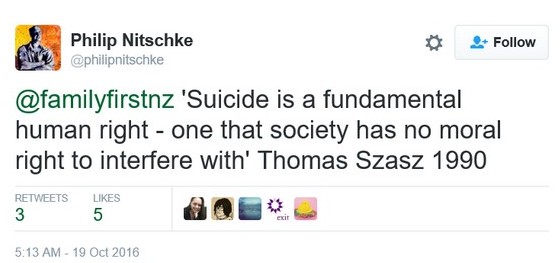
Media Release 8 November 2018
Family First NZ says that Philip Nitschke should not be allowed in the country and the police should be shutting down any meetings he is holding in New Zealand.
“At a time when we are desperate to do everything we can to lower our unacceptable and tragic rates of suicide, Nitschke is promoting a message that anybody has the right to take their own life,”says Bob McCoskrie, National Director of Family First NZ.
“His message has left a trail of destruction, and is evidence of just how far some euthanasia advocates will take an assisted suicide law if it was ever introduced. Vulnerable people are being exploited by his agenda and the police need to protect New Zealanders from him. The suicide prevention messages will be completely undermined by his messaging.”
In 2014 Nitschke came under fire from two Australian suicide prevention organisations, Beyond Blue and the Black Dog Institute, after his involvement in the suicide of a physically healthy 45-year-old Australian man, Nigel Brayley. Complaints have also been made regarding the suicides of Erin Berg, a 39-year-old mother suffering from post-natal depression who died an agonizing death from euthanasia drugs; Lucas Taylor, a 26-year-old suffering from hidden depression; Gillian Clark, a 47-year-old who was undergoing medical tests; and Joe Waterman, a physically healthy 25-year-old, among others.
The 2015 Victorian state government inquiry into end-of-life choices found that young and physically healthy people were killing themselves using a drug recommended by euthanasia groups – the same drug being recommended in NZ. The majority of those suicides were young people who were physically healthy, but mentally ill.
The Medical Board of Australia imposed 25 strict conditions on Philip Nitschke, known as Doctor Death. The board believed he “presents a serious risk to public health and safety.”
“Nitschke defends the right of someone to take their own life, even when fit and healthy. New Zealanders reject this destructive message and the police should prevent this risk to vulnerable New Zealanders. In fact, he should not even be entering the country,” says Mr McCoskrie.
“Nitschke’s promotion of suicide places large numbers of vulnerable people at risk – in particular those who are depressed, elderly, sick, disabled, those experiencing chronic illness, limited access to good medical care, and those who feel themselves to be under emotional or financial pressure to request early death.”
ENDS